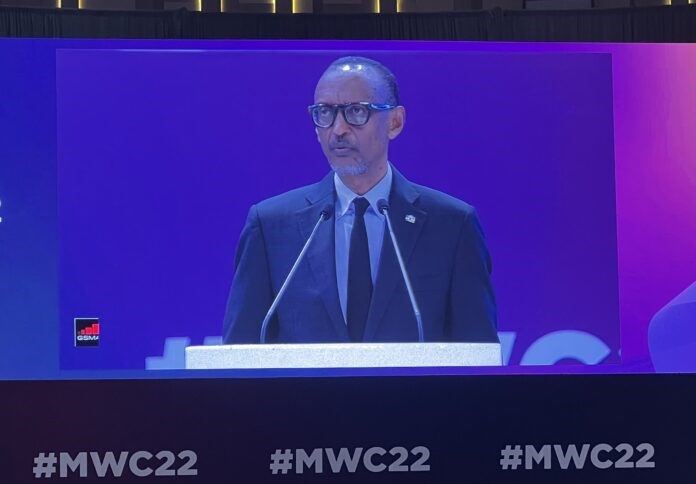Rwandan President Paul Kagame has said that bridging the huge digital gap in Africa requires deliberate and constant partnership between governments and the private sector.
He said governments must lead the way by deliberately reducing the tax burden on the private sector in exchange for obligated investments into innovations that will deliver very affordable digital access for the masses, adding that anything short of that is mere lip service that will not deliver any dividends.
President Kagame was delivering the keynote address on to the topic – Building a Digital Future Together – at the opening of the Mobile World Congress Africa in Kigali, Rwanda.
The GSMA flagship event comes to Africa for the first time and brings together over 2,000 participants from across 75 operators and with almost 400 companies in the broader mobile ecosystem, to be addressed by at least 187 speakers in 47 sessions.

In what was described as shocking statistics about the digital divide in Africa, the International Telecommunication Union (ITU) reports that in Africa in 2021, only 33 percent of the population was using the internet, meaning an estimated 871 million people are not realizing digital dividends.
This is in spite of the fact that several Africa governments, including Ghana, brag about having built substantial infrastructure geared toward driving digital inclusion.
President Kagame said it is common knowledge that technology is catalytic to national and human development and yet almost half of Africa’s population do not have access, in spite of the usual boast by governments about having built infrastructure. “Digital infrastructure is key, but it is not enough,” he said. “We must make the infrastructure meaningful to our people through deliberate partnerships with the private sector.”
Partnership in Rwanda
He noted that in Rwanda the partnership between government and private sector has been very deliberate and the message is driven regularly across the entire ecosystem to ensure that everyone is playing their part to bridge the digital gap.
According to him, digital inclusion goes beyond connectivity, explaining that if people have connectivity but cannot afford to access it, that connectivity is meaningless. Again, if people could access the connectivity but it does not address their specific economic, health, educational and other needs, that connectivity is meaningless. “Connectivity must be affordable, accessible and meaningful to the target groups and that requires very strong public and private sector partnership,” the President said.
According to him, the other factor required to make connectivity meaningful to the masses is skills development that will enable people take advantage of the digital connectivity, and that should form a critical part of government’s policy. He said, in Rwanda, partnership with the private sector has resulted in high-skilled youthful workforce, which has given birth to lots of innovative start-ups in the country.
The Youth
President Kagame noted that Africa is full of vibrant youth who are looking for opportunities to contribute to national development and “we cannot afford to reduce them to a statistic.”
He said initiatives like Smart Africa and others on the continent are geared towards addressing the digital gap, particularly from the perspective of empowering the youth with skills and resources to play an active role in the progress of the continent. “However, as individual countries we need to be deliberate and constant about public and private sector partnerships in address our specific needs within the context of bridging the digital gap at the country level and ultimately at the continental level,” he said.
According to him, African countries cannot afford to leave anyone behind the digital curve if the continent is to see a success implementation of the Africa Continental Free Trade Area (AfCFTA) initiative.










